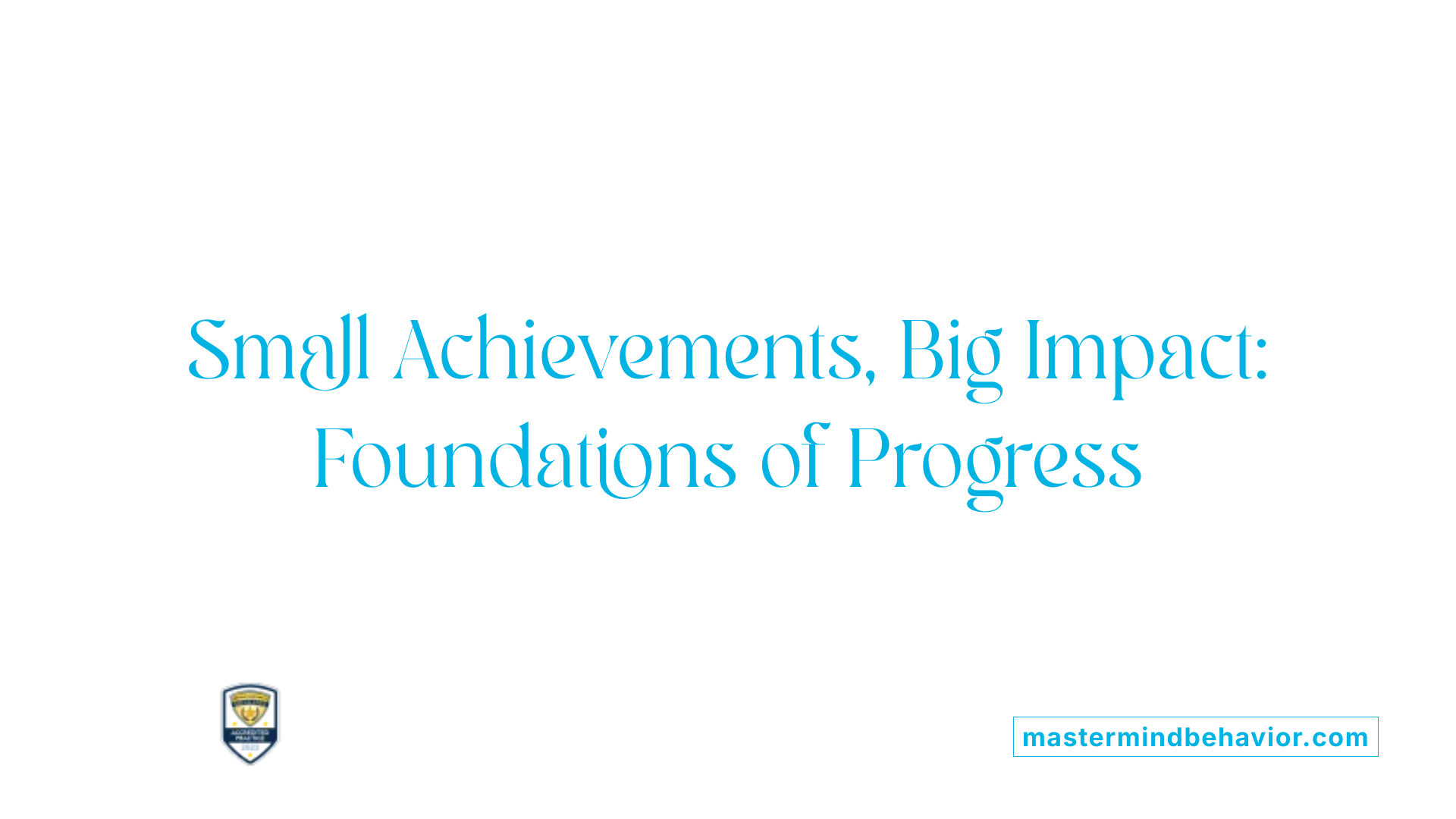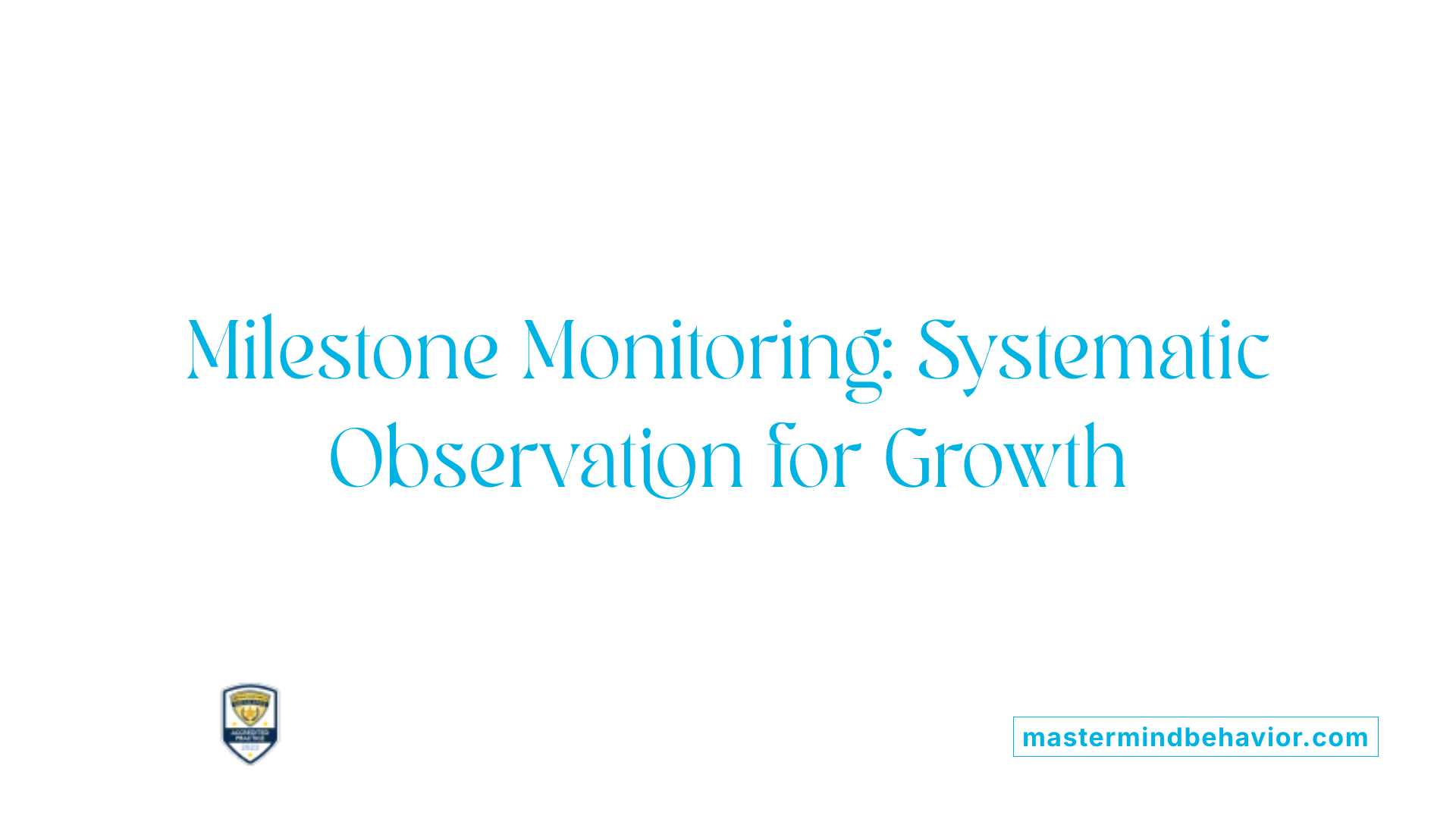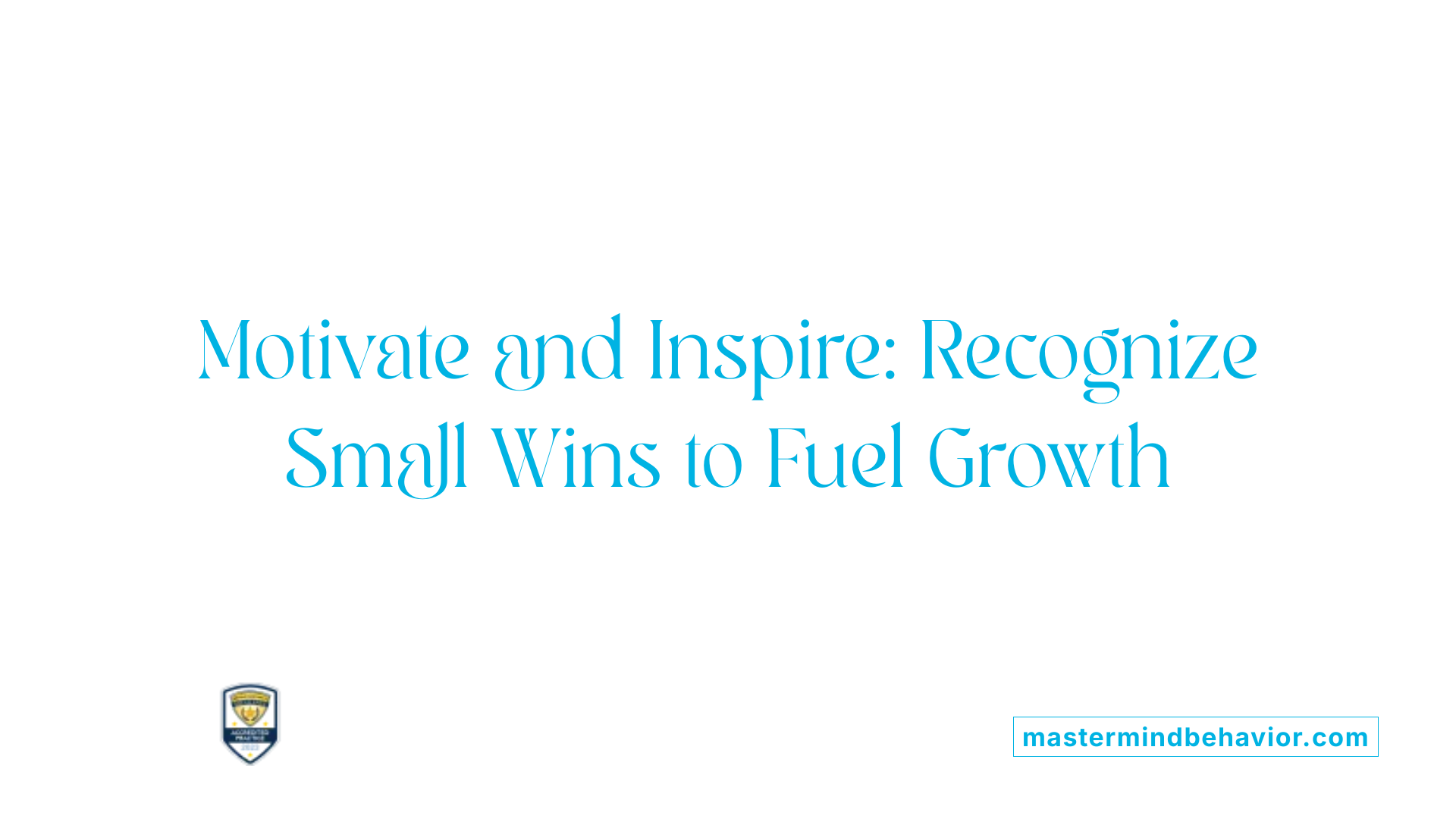Understanding the Value of Small Wins in Child Development
In ABA therapy, progress is often gradual and builds upon foundational skills learned over time. Recognizing small victories along the way is essential not only for motivating children but also for reinforcing their developmental milestones. These incremental achievements, from responding to a name to initiating social interactions, are crucial markers of growth and success.
Defining Small Wins in ABA Therapy

What is the concept of small wins in ABA therapy?
In ABA therapy, small wins refer to recognizing and celebrating each step of progress a child makes as they work toward their developmental goals. These wins can include simple but meaningful achievements like responding to their name, making eye contact, or following basic instructions. Such milestones indicate that the child is learning and applying new skills, which are foundational for further growth.
Celebrating these small achievements is vital because it reinforces positive behaviors and motivates both the child and their caregivers. Each small victory acts as a building block, gradually leading to larger, more complex skills such as engaging in social interactions or communicating effectively.
Families and therapists who focus on these cumulative successes foster a positive environment. This approach not only boosts the child's confidence but also encourages continued effort and persistence. Over time, the consistent acknowledgment of small wins helps achieve lasting developmental progress, making the journey of therapy feel rewarding and worthwhile.
Importance of acknowledging small achievements like communication and social interaction milestones
Acknowledging small achievements related to communication, such as saying a new word or following directions, is essential in fostering confidence. Similarly, recognizing progress in social interactions, like sharing or initiating play, helps children understand what behaviors are valued and encourages them to keep trying.
Celebrating these moments with praise, rewards, or involving families in tracking progress creates a supportive atmosphere. It demonstrates that every step forward, no matter how minor, is meaningful and contributes to the child's overall development.
By focusing on these incremental gains, therapists and families reinforce the idea that progress results from cumulative effort. This mindset helps in maintaining motivation, patience, and a positive outlook throughout the therapy process. Recognizing these milestones ensures that progress is not only measured by big breakthroughs but also by the smaller, yet significant, strides that form the foundation for future success.
Identifying Progress: Tracking Milestones Effectively

How can therapists and parents identify small progress milestones in children?
Recognizing small advances in a child's development involves careful observation and systematic recording of behaviors. Both therapists and parents play a vital role in this process. They monitor behaviors across different areas such as communication, social interaction, motor skills, and problem-solving. These observations are compared against typical developmental benchmarks for the child's age – for instance, a 12-month-old responding to their name or a 2-year-old stacking blocks.
Regular assessments and ongoing observations help to identify even subtle changes in a child's skills. Keeping a record of these changes over weeks or months provides insight into progress that might otherwise go unnoticed. For example, noticing consistent attempts to communicate verbally or increased participation in social settings signals meaningful growth.
Encouraging exploration and communication through fun activities can also help reveal emerging skills. When children begin to use new words, gestures, or demonstrate improved coordination, these are important milestones worth celebrating. Early detection of such progress allows parents and therapists to adjust goals and strategies promptly, ensuring that intervention remains effective.
Tracking these small milestones not only builds confidence in the child's development but also reinforces positive behaviors. It creates a clear picture of day's progress, motivating everyone involved and leading to more targeted support when needed.
Understanding developmental benchmarks for various ages
Developmental benchmarks serve as useful reference points that guide expectations and assessments. These benchmarks are well-documented in research and help caregivers identify if a child is on track or if there are areas needing extra attention.
The role of assessments and ongoing observations in detecting small progress
Consistent assessments, whether formal or informal, are essential. Behavior charts, progress notes, and milestone checklists support ongoing tracking. They help differentiate between temporary setbacks and genuine small improvements. Regularly revisiting these observations can illuminate incremental gains, such as a child responding to simple commands or beginning to imitate actions.
In conclusion, monitoring progress through systematic observation and comparison to developmental milestones ensures that even the smallest advances are acknowledged and celebrated, fostering a positive environment conducive to continuous growth.
Celebrating Small Wins: Strategies and Techniques

What are effective strategies for celebrating small achievements during ABA therapy?
Recognizing every step of progress in therapy is essential to motivate children and reinforce their efforts. One effective approach is providing immediate verbal praise, such as saying “Great job” or “I love how you responded,” which reinforces positive behavior right away.
Tangible rewards, like tokens or small treats, are also helpful. These serve as concrete acknowledgments that encourage children to continue making efforts. Using visual tools such as progress charts or trackers offers a clear view of their development and helps children and parents see how far they've come.
Making celebrations special through activities or outings can make the achievement memorable. For example, a small celebration after reaching a milestone could be a fun park visit or a favorite game.
Family involvement adds another layer of encouragement. When parents and siblings participate in recognizing and celebrating successes, it builds strong support networks around the child and values their growth.
Finally, verbal acknowledgment of even minor improvements — like a small verbal response or a slight increase in social interaction — nurtures confidence. These practices promote a positive, growth-oriented atmosphere that makes therapy engaging and effective.
Motivating Through Recognition and Celebrations

How can acknowledging small wins motivate children in ABA therapy?
Acknowledging small wins in ABA therapy can significantly motivate children by boosting their confidence and sense of accomplishment. When children see tangible proof of their progress, like responding to their name or mastering a new skill, they feel encouraged to keep trying.
Using motivational techniques such as making activities fun, offering choices within tasks, and incorporating rewards aligned with what the child enjoys can make therapy sessions more engaging. For example, giving a child a small sticker or a preferred activity as a reward for a successful interaction creates positive associations with learning.
Visual progress charts are effective tools to highlight small victories. When children can see their achievements marked visually, it provides instant, encouraging feedback that fuels their motivation to learn more.
Furthermore, celebrating perseverance and effort, not just success, fosters resilience. Recognizing when a child continues trying despite difficulties helps build their self-esteem and promotes a growth mindset.
Ultimately, integrating these positive reinforcement strategies helps shape a supportive environment that emphasizes progress, making the journey of learning rewarding and inspiring for children with autism.
The Impact of Celebrating Small Wins on Therapy Outcomes and Child Development

Why is celebrating small milestones important for child development and therapy success?
Celebrating small milestones plays a crucial role in supporting a child's growth and success in therapy. Recognizing these progress points helps reinforce learning and encourages continued effort. For children receiving therapies like ABA, speech, or occupational therapy, each small step—such as responding to their name or completing a task—is a sign of progress.
These celebrations foster a positive emotional environment, boosting children’s confidence and emotional security. When children feel successful, they develop a strong sense of achievement, which builds their self-esteem and motivates them to keep trying.
Furthermore, acknowledging milestones helps develop social and emotional skills. Celebrations, whether through praise or family traditions, teach children about effort, resilience, and the value of persistence. It also supports social interactions as children learn to share their successes with family and peers.
Monitoring and celebrating these small gains allow parents and therapists to spot developmental progress and identify areas that may require additional support. This proactive approach ensures children continue to grow healthily and maintain motivation in therapy.
In summary, celebrating small wins nurtures a positive outlook, reinforces key skills across multiple domains, and helps build a foundation for long-term developmental and therapeutic success.
Fostering a Positive Future Through Small Wins
Recognizing and celebrating small successes in ABA therapy is fundamental to fostering motivation, reinforcing desired behaviors, and supporting holistic child development. Such celebrations create a positive, motivating environment where children feel valued and empowered, fueling ongoing progress. For families and therapists alike, maintaining detailed records, engaging in meaningful celebrations, and setting realistic, achievable goals are key strategies. By valuing every small step, we build a foundation for long-term success and resilience, guiding children toward reaching their full potential with confidence and joy.
References
- Celebrating Small Wins: How Pediatric Therapy Progress ...
- Incremental Progress for Kids with Autism
- ABA Goals & Progress | New Year Family Guide - Radical Minds
- Setting Realistic Goals: What to Expect From Cleveland ...
- ABA Therapy Goals: 30 Practical Examples & Timelines
- How Families Can Support ABA Goals at Home
- Steps to Set Goals in ABA Therapy in North Carolina -
- How Are Autism Goals Set for My Child
- A Review of Parent Participation Engagement in Child and ...








